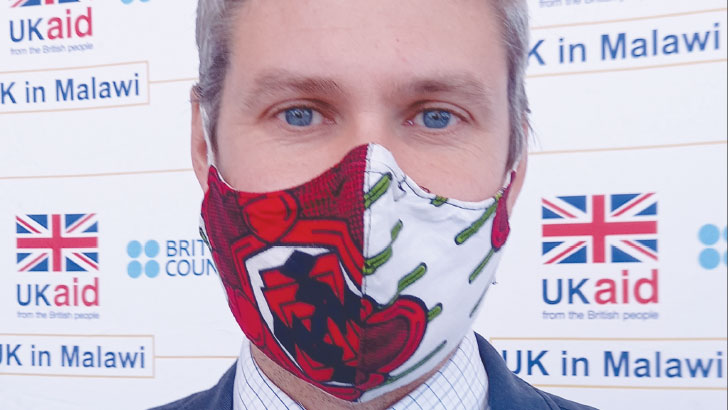UK tips Malawi on Trade growth areas
The British Government has advised Malawi to focus on unleashing the power of the private sector to create growth and substitute low-value with high value crops in the Affordable Inputs Programme.
British High Commissioner David Beer said this on Friday in Mchinji on the sidelines of a symbolic handover of Covid-19 isolation and screening facilities built at Songwe, Mwanza, Dedza and Mchinji border posts.
The project, which is supported by the British Government, was implemented by the TradeMark East Africa in collaboration with the ministries of Trade and Health to promote safe cross-border trade amid the Covid-19 pandemic.
Beer said Malawi’s ratification of the Africa Continental Free Trade Area Agreement (AfCFTA)—a single continent-wide market for goods and services and to promote the movement of capital and natural persons—was a huge step forward.

But he said the cost of production, which makes prices of goods and services expensive, will render Malawi uncompetitive on the continental market that connects 1.3 billion people across 55 countries with a combined gross domestic product valued at $3.4 trillion.
Said Beer: “Malawi needs to shift away from low-value crops such as maize and soya and it needs to wean itself off tobacco.
“Malawi’s comparative advantage is not in producing these crops and the environmental damage brought by a maize monoculture is becoming clearer. The focus must, therefore, shift to high-value crops such as spices, nuts, berries and other high-value fruits.”
He said such crops are in high demand in many lucrative markets globally, observing that a hectare of macadamia nuts, for example, is valued at around four times higher than a hectare of tobacco and over 20 times higher than a hectare of maize.
The envoy advised government to look at shifting its resources and energies away from subsidised agricultural inputs on low-value crops and towards a policy mix centred on key infrastructure such as energy, irrigation and transport, and policies that create a more predictable business environment and lower costs.
“I do not pretend this shift will be easy. Tough decisions are needed. Government cannot, and should not, try to do everything. The private sector is the engine of growth and this requires government loosening its grip on some key sectors,” he said.
TradeMark East Africa economic and trade adviser Victor Mponda-Banda said the isolation centres were within the Safe Trade Emergency Plan for Malawi initiative.
He said the ultimate focus is to ensure safer operations for frontline staff at borders and facilitating safer and efficient movement of key value chains along the trade corridors.
Ministry of Trade Principal Secretary Christina Zakeyo said Malawi is working on diversifying the export basket and developing value-added products.
She said: “We need to enhance value addition of most of the crops that we produce. We have the National Export Strategy which emphasises on value addition, so we are encouraged by the British Government for taking the initiative.”
The second National Export Strategy (NES II), which covers the period between 2020 and 2025, aspires to reduce the trade deficit by 25 percent.
On fiscal side, the strategy aspires to increase government funding to export promotion by 40 percent while doubling foreign direct investment by 2025.





